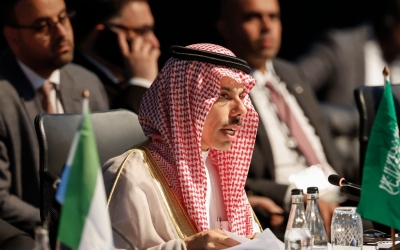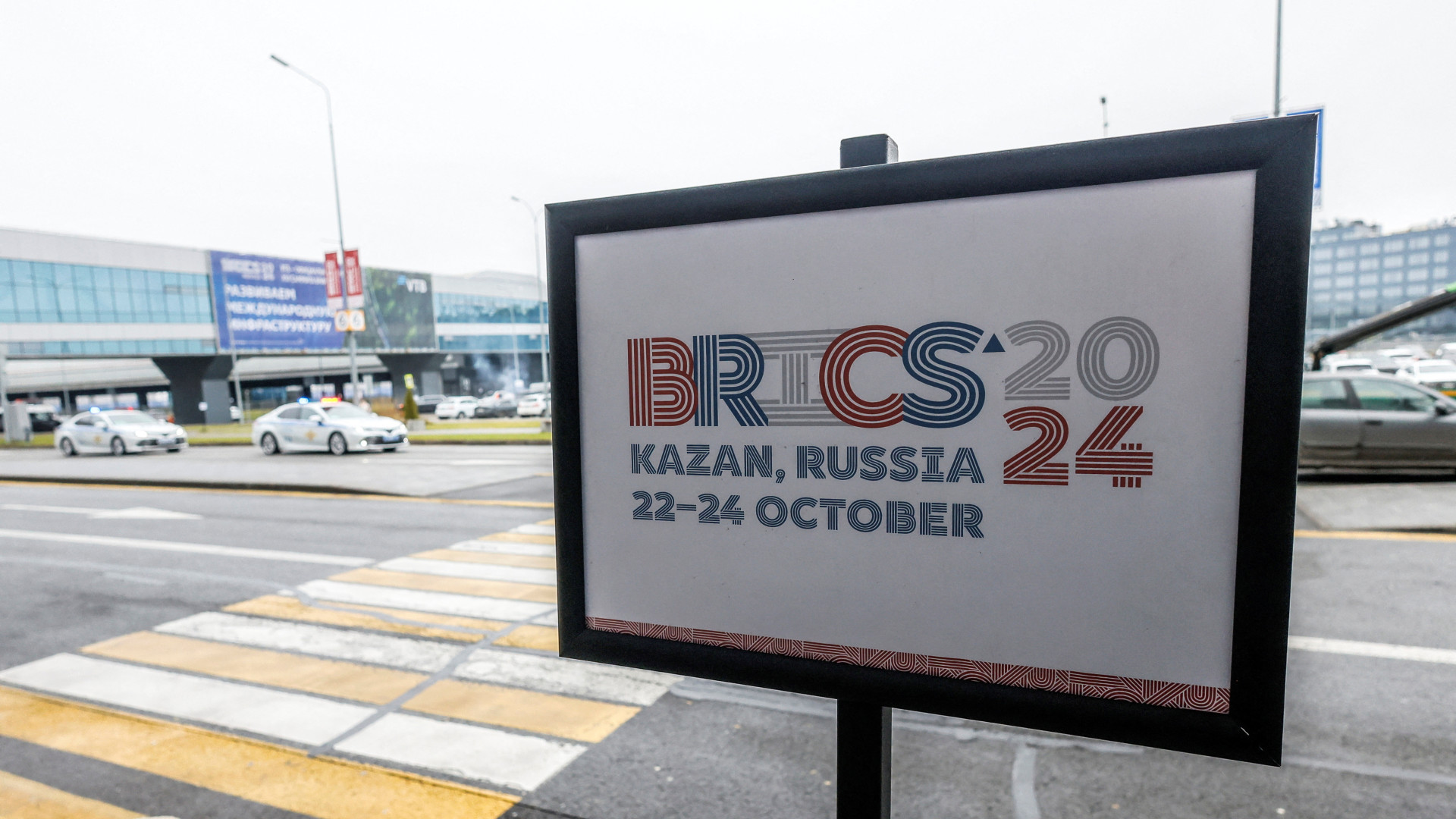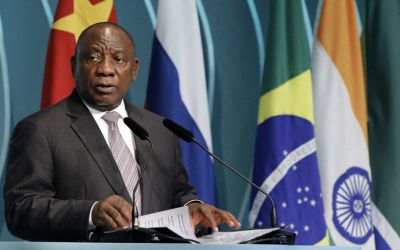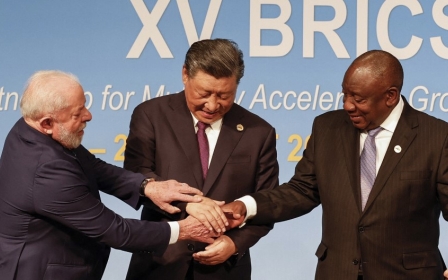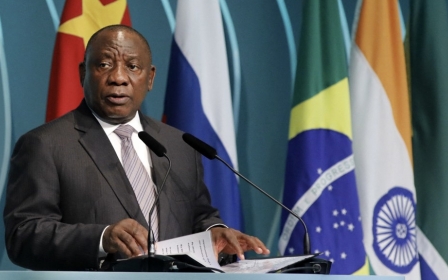Can the Brics end US hegemony in the Middle East?
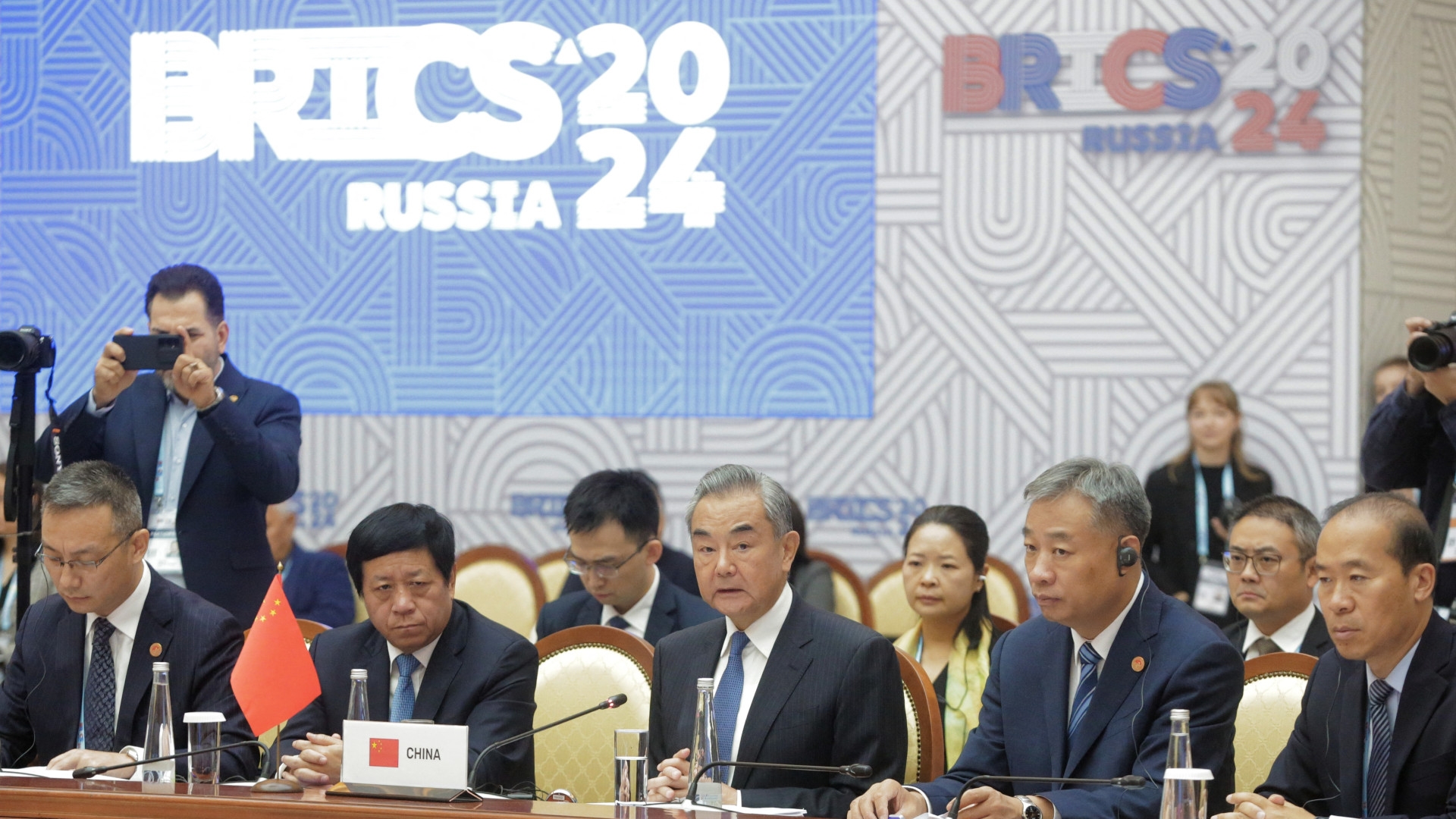
The Brics annual summit, taking place from 22 to 24 October, has begun today in Kazan, Russia.
Ahead of the summit, the geopolitical bloc, led by Russia and China, released a historic report proposing the creation of new infrastructure to trade and transfer money using their national currencies, instead of the US dollar.
This could be a significant development, as some experts believe that the "weaponisation" of the dollar against countries whose policies the US opposes through sanctions, freezing assets, and other measures has undermined international confidence in the dollar and prompted a global push for de-dollarisation.
New MEE newsletter: Jerusalem Dispatch
Sign up to get the latest insights and analysis on Israel-Palestine, alongside Turkey Unpacked and other MEE newsletters
Since 1944, the hegemony of the US dollar over all other world currencies has allowed the US to influence and, in many ways, control the policies of most developing countries, including in the Middle East.
For decades, the US has maintained a global edge in terms of military power, technological development, and control over natural resources. However, economists believe that the dollar - considered to be the sole global reserve currency - is one of the most crucial elements of US hegemony, especially over countries with emerging economies.
This fact has been most acutely felt over the last 12 months as the global community has been unable or unwilling to challenge US policies and stop Israel's genocide in Gaza.
The US has imposed its policies on much of the Arab world through foreign and military aid for countries such as Egypt, Jordan, Iraq, and other poor countries in the region.
Wealthier countries like Saudi Arabia and the UAE have prioritised their interests with the US and thus have not taken any meaningful action to end the ongoing aggression in Palestine and Lebanon.
If Brics adopts a unified currency, it would be a pivotal and strategic move that would further weaken the US dollar's position
However, in recent years, Brics nations have increased their gold shares, with leaders seeking to reduce their countries' reliance on the US dollar.
Even European Union members, including the German foreign minister, recently expressed their desire for an EU-based payments system, absent the dollar and independent of the US.
While the dollar continues to dominate currency trading at 90 percent, it still managed to drop to a 20-year low in foreign exchange reserves in 2022.
Since its launching in 2009, Brics has championed a multipolar international order and a fair global financial and trade system, which remains a key ambition of the Global South. Brics nations are now in talks to establish a new reserve currency that would allow their countries greater economic independence.
In light of the US-backed wars across the Middle East, many are hoping that a significant decline in the US dollar's dominance as a global reserve and international trade currency will inhibit its destructive influence over the world.
But who can dethrone the US dollar as much of the Global South hopes?
De-dollarisation
The Brics bloc can play a significant role in challenging the dominance of the US dollar.
This will occur by increasing their countries' holdings of gold and key currencies like the Chinese yuan rather than the US dollar and forming non-dollar trade agreements.
Needless to say, the founding countries of the Brics bloc do not have much affection for the US and its policies, especially Russia and China.
After the US government froze Russia's $300bn liquid foreign exchange reserves following its invasion of Ukraine in 2022, with an intent to give some of them to Kyiv, Russian President Vladamir Putin suggested investing in hard assets like gold or oil.
According to reports, as of 2024, the central bank gold holdings of Brics nations plus Egypt "accounted for more than 20 percent of all the gold held in the world's central banks. Russia, India and China rank in the top 10 for central bank gold holdings".
Despite the US dollar's dominance for more than 80 years, its share of global monetary reserves has decreased since the early 2000s from about 73 to 58 percent in favour of gold and non-traditional currencies.
Several countries have reduced their holdings of US Treasury bonds, with some, like Russia and Turkey, bringing them down to zero. Seven countries that were among the main and traditional owners of US Treasury bonds have reduced their holdings by a total of $2 trillion during the past decade, including Japan, Russia, China and even Saudi Arabia and the UAE.
As a result, it is noted that while the US public debt has doubled over the past decade from $17.8 trillion to more than $35 trillion today, the value of Treasury securities held by non-Americans remained unchanged at $8 trillion, revealing a drop from 45 to 23 percent in US bonds held by foreigners, out of the total number of bondholders.
Carrot and stick
The US has used a carrot-and-stick approach to impose its policy on the Arab world.
Bribery in the form of US aid has long been used with compliant regimes and governments. Egypt is a good example in this regard, as the Egyptian army has enjoyed a yearly aid of $1.3bn since the 1979 Egypt-Israel Peace Treaty, and remained compliant with US policies in the region.
Optimistic observers believe that the Brics bloc can contribute effectively to removing the dollar from its throne
Alternatively, the US has utilised the stick against regimes that sought to implement an independent policy.
The US has indirectly punished countries by removing them from the Swift payment system and preventing them from transferring any funds between banks, constituting a "severe national blow" to countries like Iran.
The US has also weaponised direct sanctions against regimes that do not conform to its policies, which it has imposed on those countries' investments, whether in US markets or those of its allies. Countries like Iran, Syria, and Iraq have been notable targets of these notorious practices.
Indeed, such measures imposed by Washington would not have succeeded without the stature of the US dollar.
Follow Middle East Eye's live coverage of the Israel-Palestine war
The ongoing Brics summit, attended by 32 countries, including the nine members of the bloc, is expected to address requests of more than 30 countries to join or cooperate with the bloc.
It will also discuss promoting the use of local currencies in intra-trade and even with non-member nations.
The Bloc has also proposed the creation of a Cross-Border Payment Initiative (Bcbpi), which aims to minimise reliance on the sole cross-border payment system dominating now and to encourage countries to use their national currencies in international intra-trade.
Brics has also announced its plans to establish an alternative to the US-controlled Swift system. It will allow its members who otherwise "have no effective way of controlling or influencing the decision-making body that governs Swift's operations" to transfer payments between their countries' central banks without barriers. For such purposes, Brics plans to try blockchain technology along with central bank digital currencies (CBDC).
While it has not yet been confirmed whether discussion of a unified currency for the bloc's countries is on the agenda, if such a plan were to be adopted, it would be a pivotal and strategic move that would further weaken the US dollar's position.
Optimistic observers believe that the Brics bloc can contribute effectively to removing the dollar from its throne. So what can the Brics countries do in this regard?
The countries comprising the Brics alliance enjoy tremendous advantages that could enable them to achieve their objectives of a multipolar world, as well as a fair financial and trade system for the benefit of the Global South.
During the August 2023 summit in Johannesburg, South Africa, Brics invited six countries to join the bloc. Four new members were officially confirmed: Egypt, Iran, Ethiopia, and the UAE. Argentina declined the invitation, and Saudi Arabia is still considering joining.
With this expansion, Brics Plus (as it is informally known today) constitutes about 46 percent of the world's population and 28 percent of the global economy, and its GDP on a purchasing power parity basis (PPP) is 35 percent, exceeding that of the G7, which barely hits 30 percent of the global GDP (PPP).
As for energy sources, the bloc members own 47 percent of the world's oil reserves and 50 percent of its natural gas reserves.
Brics members are working towards deepening inter-trade using local currencies instead of the US dollar, including buying and selling energy sources without resorting to the dollar. The greenback is the sole currency used in the petrodollar trade, while the largest buyers, as well as the largest sellers, are Brics members, assuming that Saudi Arabia officially joins the bloc.
Brics also established its own bank, the New Development Bank, which aims to compete with the World Bank and the IMF.
Ending US hegemony
While Brics members might be split on the creation of a shared currency, many are in agreement that they must not be dependent on a single currency like the US dollar.
As the US continues to face greater international isolation for its support for Israel, many hopeful observers in the Arab world view the erosion of the dollar's dominance as the beginning of the end of US global hegemony.
If governments and individuals worldwide are less inclined to accept a weakened US dollar, then the US will be forced to halt its printing of billions of dollars that are bankrolling Israel's genocidal wars against both Palestine and Lebanon.
However, while Brics could be a powerful means of achieving this goal, it alone cannot change US policies in the Middle East. Arab countries must also take some strategic steps, including gradually ending their economic and monetary dependence on the US, especially those that peg their currencies to the US dollar instead of a basket of currencies, as in the case of Kuwait.
They must also expand their gold holdings, as most major countries like China, India, and Turkey are doing, and join big economic blocs like Brics, as Iran, UAE, and Egypt did.
All of this requires a change in the mentality of Arab governments, which is difficult to achieve under the current circumstances and may require a new Arab Spring to transform their approach.
The views expressed in this article belong to the author and do not necessarily reflect the editorial policy of Middle East Eye.
Middle East Eye delivers independent and unrivalled coverage and analysis of the Middle East, North Africa and beyond. To learn more about republishing this content and the associated fees, please fill out this form. More about MEE can be found here.



